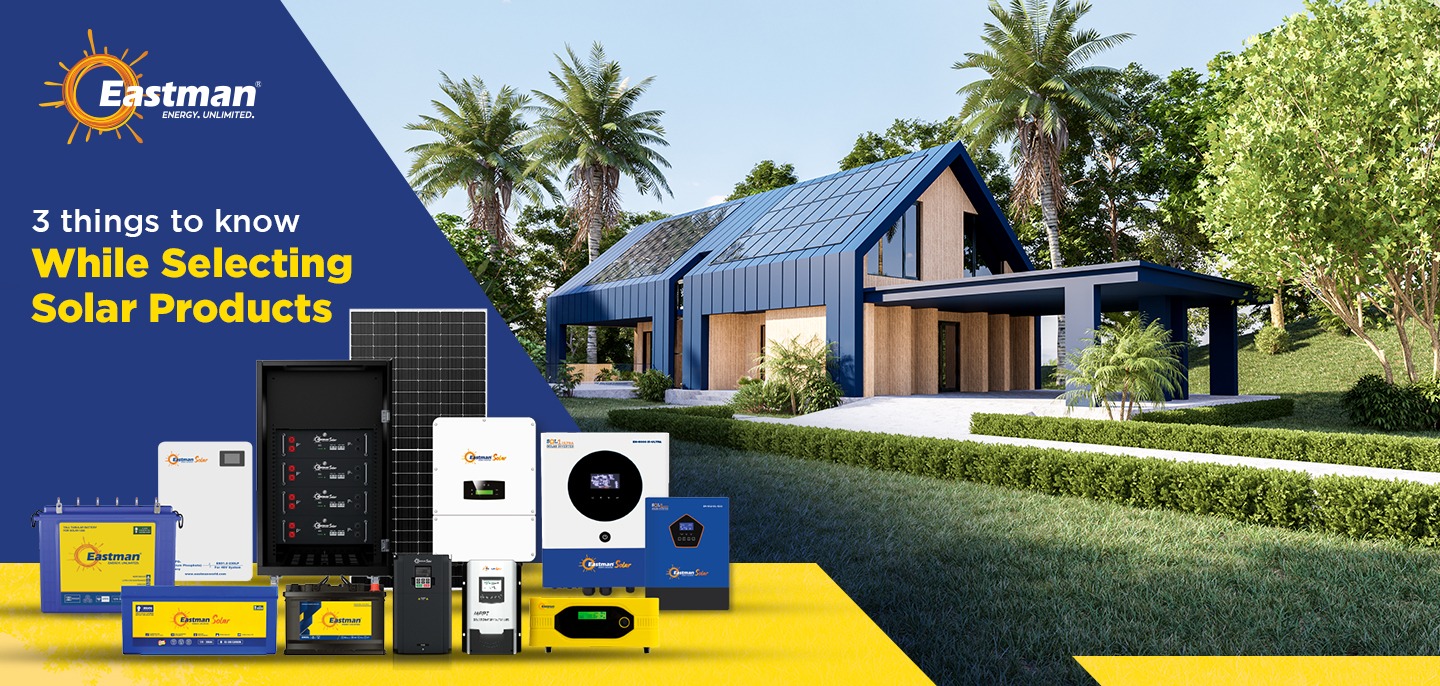
3 things to know While Selecting Solar Products
As solar energy becomes an increasingly popular choice for homeowners and businesses, selecting the right solar products can be overwhelming. With so many options available—solar panels, inverters, batteries, and charge controllers—it’s crucial to make informed decisions that maximize energy efficiency, minimize costs, and ensure long-term reliability. Whether you’re considering a small residential setup or a large-scale commercial system, here are three essential things to keep in mind while selecting solar products.
Efficiency and Performance
Why It Matters: Efficiency directly affects how much energy your solar system can generate, store, and use. The more efficient the solar products, the more electricity you can generate from the available sunlight, meaning more savings on energy bills and a quicker return on investment.
What to Consider:
Solar Panels: The efficiency of solar panels determines how much sunlight they can convert into electricity. Monocrystalline panels typically have the highest efficiency (18-22%), making them ideal for areas with limited roof space. Polycrystalline panels are slightly less efficient but more affordable, while thin-film panels offer flexibility and are often used for specialized applications.
When selecting solar panels, look for those with higher efficiency ratings if space is limited or you want to maximize your energy output. High-efficiency panels may come at a premium cost, but their long-term performance justifies the investment by generating more power over time.
Inverters: The inverter is responsible for converting the DC (direct current) power generated by the panels into AC (alternating current) power that can be used in your home or business. Choose an inverter with Maximum Power Point Tracking (MPPT) technology, which helps extract the maximum amount of energy from each panel, particularly under varying sunlight conditions. The inverter's efficiency is important too—typically ranging from 95% to 98%—as a higher-efficiency inverter will minimize energy loss during conversion, ensuring the system performs optimally.
Batteries: If you're integrating energy storage into your system, the battery's efficiency is key. Lithium-ion batteries generally offer higher round-trip efficiency (90-95%) than traditional lead-acid batteries, meaning more of the energy you store is usable later.
Quality and Durability
Why It Matters: Solar products are long-term investments, with many systems expected to last 20-30 years. The quality and durability of the components you choose directly impact the system’s longevity, performance, and maintenance costs.
What to Consider:
Warranties: Quality products usually come with comprehensive warranties. For example, high-quality solar panels typically offer a 25-year performance warranty, guaranteeing that they will produce a certain level of energy over their lifetime. Inverters, on the other hand, typically have a warranty of 5-10 years. Always check the warranty coverage and consider manufacturers that stand behind their products with solid customer support.
Weather Resistance: Solar panels and other components are exposed to outdoor elements like wind, rain, snow, and extreme temperatures. Look for solar panels with a high IP rating (Ingress Protection), typically IP65 or higher, which ensures they are dust- and water-resistant. Additionally, check if your solar products are rated to withstand heavy winds and hail if you live in a region prone to such weather.
Material Quality: Choose products made from high-grade materials, as these tend to perform better and last longer. Monocrystalline silicon panels, for example, are made from a single continuous crystal structure, which gives them superior efficiency and durability compared to polycrystalline or thin-film panels. Similarly, premium inverters often use advanced cooling technology to prevent overheating and ensure long-term reliability.
Cost and Return on Investment (ROI)
Why It Matters: While solar energy offers tremendous long-term savings, it's important to balance initial costs with the expected return on investment (ROI). Choosing the right products can make a significant difference in how quickly you recoup your investment and start saving on energy bills.
What to Consider:
Upfront Costs: Solar products, such as panels, inverters, and batteries, can be a significant upfront investment. While more efficient and durable products typically come at a higher cost, they often deliver better long-term savings. For instance, high-efficiency monocrystalline panels may cost more initially, but they generate more power over their lifespan compared to lower-efficiency alternatives, leading to greater overall savings.
Incentives and Rebates: Take advantage of government rebates, tax credits, and incentives available in your region. These can significantly reduce the upfront costs of installing a solar system. For example, in many regions, solar installations are eligible for investment tax credits (ITC) or grants, which can cover a substantial portion of the initial investment.
Payback Period and Savings: Calculate the payback period, which is the time it will take for your solar system to pay for itself through energy savings. A typical residential solar system has a payback period of around 6-8 years, after which you’ll be enjoying almost free electricity. Be sure to consider factors like local electricity rates, how much sunlight your location receives, and the system’s energy output when estimating savings. Some systems with integrated energy storage (batteries) may take longer to pay off but can offer more energy independence, especially in regions prone to power outages.
Conclusion
Choosing the right solar products is essential for maximizing the performance, efficiency, and financial benefits of your solar energy system. By keeping these three key factors in mind—efficiency, quality, and cost/ROI—you can make informed decisions that will ensure you get the best value for your investment.
Whether you're installing a solar system for your home or business, consider working with trusted and reputable brands that offer high-quality components with long-term warranties, excellent performance, and strong customer support. Solar energy is not just an environmentally-friendly solution but also a financially savvy investment, and with careful selection, you can make it work for you.
For reliable, high-performance solar solutions, Choose Eastman—a trusted name in solar energy products, offering high-quality inverters, batteries, and solar panels that deliver efficiency, durability, and long-term savings.